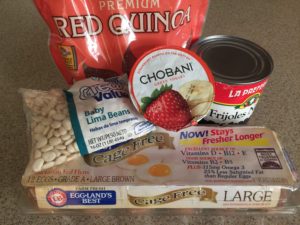Alternative Protein Sources!
 Along with fat and carbohydrates, protein is considered a macronutrient which means we have to consume adequate amounts to stay healthy. Protein is essential to our existence. Hair, skin and muscle are primarily derived from protein. Protein is often associated with weight training and building lean muscle, however a balanced diet adequate in protein can also help us maintain a healthy weight, build and repair muscle tissue, and curb our appetite. Depending on your fitness goals, the amount of protein you should consume may vary. Now, if you are one of those who has a protein deficient diet due to the fact that you don’t like meat, not to worry. Here are 6 meatless protein sources you may incorporate into your diet.
Along with fat and carbohydrates, protein is considered a macronutrient which means we have to consume adequate amounts to stay healthy. Protein is essential to our existence. Hair, skin and muscle are primarily derived from protein. Protein is often associated with weight training and building lean muscle, however a balanced diet adequate in protein can also help us maintain a healthy weight, build and repair muscle tissue, and curb our appetite. Depending on your fitness goals, the amount of protein you should consume may vary. Now, if you are one of those who has a protein deficient diet due to the fact that you don’t like meat, not to worry. Here are 6 meatless protein sources you may incorporate into your diet.
1. Eggs
A single hard-boiled egg with the yolk will provide you with 6 grams (g) of protein. Not only are eggs an incredible source of protein, but they also contain several B vitamins responsible for energy, including B6, B12, thiamin, riboflavin, and folate. The all-natural, high-quality protein found in eggs is often used as the benchmark for evaluating the protein quality of other foods. Although it is true that eggs are high in cholesterol, they are only high in HDL “good” cholesterol and do not have an unhealthy impact on our cholesterol levels.
2. Greek Yogurt
You can’t go wrong with a serving of Greek yogurt, which can contain up to 20g of protein. While Greek yogurt is packed with almost double the amount of protein as regular yogurt, it also contains fewer carbohydrates. Greek yogurt is also recommended as a substitute for other dairy products such as sour cream, cheese, and ice cream thanks to its low-fat content. You can also make your tuna or chicken salad healthier by substituting mayonnaise for Greek yogurt.
3. Nuts
Almonds, pistachios, walnuts, peanuts, and cashews are packed with all three macronutrients on top of essential micronutrients such as vitamin E, vitamin B6, magnesium, phosphorus, zinc, and potassium. The protein count for each type of nut includes 5.9g for 22 unsalted almonds, 5.9g for 49 unsalted pistachios, 4.3g for 14 walnut halves, 6.7g for 35 unsalted peanuts, and 4.3g for 18 cashew halves.
4. Chia Seeds
As tiny as it is, this tiny super-food is packed with omega-3 fatty acids, fiber, antioxidants, and, of course, protein. An ounce of chia seeds contains 4g of high quality protein, 12g of carbohydrates (11 of which are fiber), and 9g of fat (5 of which are Omega-3s).
5. Lentils
Vegetarians rely on beans as a major source of protein for their meatless diet, and for good reason. Similar to nuts, protein can be found in a variety of different bean choices, including soybeans (28.5g of protein per cup), kidney beans (15g of protein per cup), black beans (15g of protein per cup), pinto beans (15.5g of protein per cup), and lima beans (14.5g of protein per cup).
6. Quinoa
A single cup of quinoa is packed with around 24g of protein. It is also considered a complete protein, which means it contains all nine essential amino acids that have to come from food, since they are not naturally produced by the body.
For more information on losing fat, building muscle, nutrition and health, or if you’re frustrated with your level of fitness and have been thinking about hiring a personal trainer, contact us.

